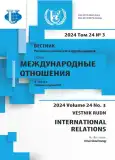European Criticism of China’s Human Rights’ Policy: Political and Ideological Aspects
- Authors: Litvak N.V.1, Pomozova N.B.2
-
Affiliations:
- MGIMO University
- HSE University
- Issue: Vol 24, No 3 (2024): China’s Global Strategy
- Pages: 467-482
- Section: BILATERIAL RELATIONS
- URL: https://journal-vniispk.ru/2313-0660/article/view/320698
- DOI: https://doi.org/10.22363/2313-0660-2024-24-3-467-482
- EDN: https://elibrary.ru/YXJUKG
- ID: 320698
Cite item
Abstract
For several decades, the issue of human rights has been an instrument of Western pressure on China, and also serves as a pretext for foreign policy decisions (such as the imposition of sanctions). As part of its discursive policy, China has recently shifted from a defensive to an offensive position, including on the issue of human rights. This dynamic is considered in this study using the example of three issues that have been most actively discussed in Western discourse in recent years - Hong Kong, the Xinjiang Uygur Autonomous Region and methods of combating COVID-19. The relevant discourse of China not only defended the right to its own development model, but also highlighted the shortcomings of Western systems. This discursive practice corresponds to the fundamental differences in the understanding of human rights in China and Europe, which are shown in the analysis of the provisions of the second chapter of the People’s Republic of China (PRC) Constitution, the Charter of the European Union on Human Rights, and the European Convention for the Protection of Human Rights and Fundamental Freedoms. Despite the fact that European politicians see themselves as the main proponents of democratic rights and freedoms in the world, sociological surveys show a low level of satisfaction of respondents in the United Kingdom (UK), Germany, France and Italy with how the principles of democracy are respected in their own countries, against the backdrop of deep dissatisfaction with their economic situation. Moreover, in many ways, Europe’s position does not seem to be principled, but opportunistic, since China’s position on the topics mentioned above has not changed, but now European criticism has practically switched to the “Taiwan issue.”
About the authors
Nikolay V. Litvak
MGIMO University
Email: jourfr@mail.ru
ORCID iD: 0000-0003-1621-0005
SPIN-code: 4168-7976
PhD, Dr. of Sc. (Sociology), Professor, Department of Philosophy
Moscow, Russian FederationNatalia B. Pomozova
HSE University
Author for correspondence.
Email: npomozova@mail.ru
ORCID iD: 0000-0002-9981-0593
SPIN-code: 5774-6654
PhD, Dr. of Sc. (Sociology), Leading Researcher, Centre for Comprehensive European and International Studies (CCEIS), Faculty of World Economy and International Affairs
Moscow, Russian FederationReferences
- Aryodiguno, H. (2021). Understanding Xinjiang from a Chinese nationalist’s perspective. AEGIS: Journal of International Relations, 5(1), 67-78. Retrieved from https://www.researchgate.net/publication/361114519_ Understanding_Xinjiang_from_a_Chinese_Nationalist’s_Perspective
- Biddulph, S., & Rosenzweig, J. (Eds.). (2019). Handbook on human rights in China. Northampton, MA: Edward Elgar Publishing Ltd. https://doi.org/10.4337/9781786433688
- Çaksu, A. (2020). Islamophobia, Chinese style: Total internment of Uyghur Muslims by the People’s Republic of China. Islamophobia Studies Journal, 5(2), 175-198. Retrieved from https://www.jstor.org/stable/ 10.13169/islastudj.5.2.0175
- Çiçek, A. (2022). “Political re-education camps” in Xinjiang as a part of panopticon-like society: Clashing discourses of Western and Chinese media. Wschodnioznawstwo, 16, 269-298. https://doi.org/10.4467/20827695WSC.22.017.16766
- Coxon, B. (2022). Beyond the basic law: Interpretive principles protective of fundamental rights in Hong Kong. Common Law World Review, 51(4), 248-267. https://doi.org/10.1177/14737795221116395
- Denisov, I. E. (2015). Chinese and Western values in the modern political discourse of China. Polis. Political Studies, (6), 35-44. (In Russian). https://doi.org/10.17976/jpps/2015.06.06; EDN: UOHUUN
- Ding, Difeng, & Zhang, Ruilian. (2022). China’s COVID-19 control strategy and its impact on the global pandemic. Frontiers in Public Health, 10, 1-10. https://doi.org/10.3389/fpubh.2022.857003
- Finley, J. S. (2019). Securitization, insecurity and conflict in contemporary Xinjiang: Has PRC counter-terrorism evolved into state terror? Central Asian Survey, 38(1), 1-26. https://doi.org/10.1080/02634937.2019.1586348
- Lemos, M., & Costa, M. J. (2022). The Extradition Bill of Hong Kong revisited, the National Security Law and the irony of human rights protection in “one country, two systems”. Revista Brasileira de Direito Processual Penal, 8(3), 1503-1536. https://doi.org/10.22197/rbdpp.v8i3.701
- Li, Yulong, Wu, Yuxi, & Xiao, Mingfeng. (2023). A corpus-based discourse analysis of liberal studies textbooks in Hong Kong: Legitimatizing populism. Politics and Governance, 11(2), 261-271. https://doi.org/10.17645/pag.v11i2.6550
- Lomanov, A. V. (2022). Human rights in modern ideology of the Communist Party of China. Orientalistica, 5(4), 882-897. (In Russian). https://doi.org/10.31696/2618-7043-2022-5-4-882-897; EDN: ZLVYQV
- Moiseev, S. V. (2021). Implementation of the “strike hard” policy on extremism and terrorism in Xinjiang Uyghur Autonomous Region of China. Vestnik Sibirskogo Yuridicheskogo Instituta MVD Rossii, (4), 104-109. (In Russian). EDN: QAYLXI
- Novichkov, V. S. (2017). Priorities of ethnic policy in the Xinjiang Uyghur Autonomous Region, China, since 2000. Tomsk State University Journal, (424), 116-122. (In Russian). https://doi.org/10.17223/15617793/424/16; EDN: ZWZNOP
- Petushkova, V. V. (2021). The impact of the COVID-19 pandemic on China’s economy: 2020 results. Economic and Social Problems of Russia, (3), 104-122. (In Russian). https://doi.org/10.31249/espr/2021.03.06; EDN: ESVWQN
- Roberts, S. R. (2018). The biopolitics of China’s “war on terror” and the exclusion of the Uyghurs. Critical Asian Studies, 50(2), 232-258. https://doi.org/10.1080/14672715.2018.1454111
- Rošker, J. S. (2021). Intercultural dialogues in times of global pandemics: The Confucian ethics of relations and social organization in Sinic societies. Ethics & Bioethics (in Central Europe), 11(3-4), 206-216. https://doi.org/10.2478/ebce-2021-0011
- Seregina, T. N., Evlakh, A. A., & Kuzmin, S. N. (2021). Comparative analysis of models for combating COVID-19 (by the example of Sweden and China). Manuscript, 14(5), 933-939. (In Russian). https://doi.org/10.30853/mns210191; EDN: AYXOOZ
- Tsvyk, A. V. (2017). Human rights: A view from China. Asia and Africa Today, (10), 51-55. (In Russian). EDN: ZMVSUD
- Tsvyk, A. V., & Tsvyk, G. I. (2019). China’s human rights concept and its international promotion. RUDN Journal of Sociology, 19(1), 20-30. https://doi.org/10.22363/2313-2272-2019-19-1-20-30; EDN: YXEHQL
- Vechkanova, N. V. (2010). Constitutional regulation of personal rights and freedoms in the Asian states of the Pacific region. Gosudarstvennaya Vlast' i Mestnoe Samoupravlenie, (12), 7-12. (In Russian). EDN: NDCXGR
- Zhao, Rong, & Xu, Fengcai. (2021). The advantages of the Chinese model: China’s experience in fighting the coronavirus in the Russian press. World of Russian-Speaking Countries, (1), 17-32. (In Russian). https://doi.org/10.20323/2658-7866-2021-1-7-17-32; EDN: CPLLEW
Supplementary files









